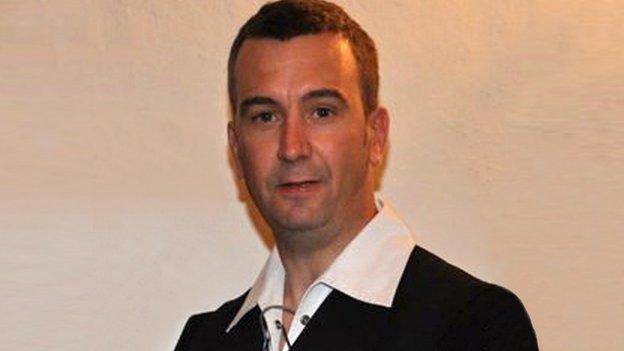Alan Henning: An ordinary man who wanted to help Syrians
- Published
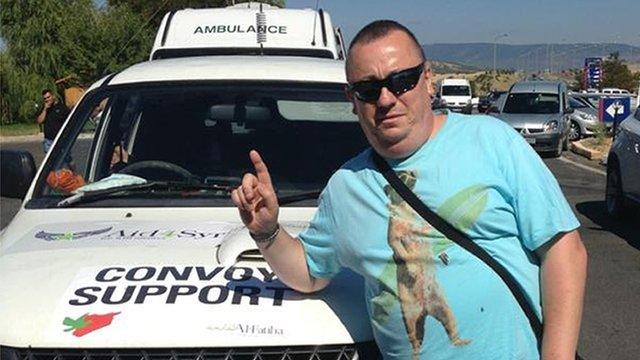
Alan Henning was captured by militants in December 2013
When Alan Henning, a 47-year-old taxi driver from Eccles in Salford, was on his way to Syria in an aid convoy late last year, he said it was important to make sure aid was going to "the right people".
But his charitable actions took him into the hands of Islamic State (IS), who took him hostage within minutes of him arriving in the country in December 2013.
A video has now been released, apparently showing Mr Henning being killed.
His kidnapping was not made public until nine months later when he became the fourth Western hostage - after US journalists James Foley and Steven Sotloff and British aid worker David Haines - to be paraded in a video by the extremist organisation.
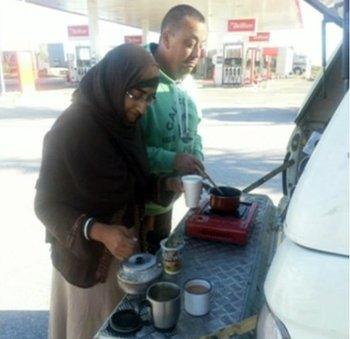
Alan Henning seen here making tea during a convoy trip
The married father-of-two, known as "Gadget" or "Gadge" to friends because of his technical skills, had been on an informal convoy with British Muslims when he was kidnapped in Ad Dana, an area held by IS, on 27 December 2013.
His colleagues were people he had got to know through his work as a taxi driver, and he had already travelled on three convoys before the one on which he was kidnapped.
Prior to travelling to Syria for the fourth time, he told BBC News he was not a Muslim himself, but that visiting a refugee camp had changed his life and he had felt compelled to return.
The group left the UK a week before Mr Henning's capture and had been intending to deliver aid to refugees.
Volunteers had raised money to buy potentially vital medical equipment, including former NHS ambulances, which they planned to deliver to hospitals.
Items such as baby milk, nappies and food were packed into the back of the ambulances in the UK and driven more than 3,000 miles overland, before crossing into Syria from Turkey.
Mr Henning had been washing cars in the UK to raise money for donations.

When I met Alan Henning
The BBC's Catrin Nye describes meeting Alan Henning ahead of one of his aid trips
I met and filmed Alan Henning in Salford in October when he was packing up for an aid convoy.
At this point, he had already travelled to Syria on three convoys.
When I asked him why he was going back to such a dangerous country he told me he had been inspired by friends.
After experiencing a refugee camp, life at home had never quite been the same for him. He described holding children and how it had affected him.
When he came back to the UK he found it difficult - Syria was drawing him back.
He told me he had to go back.
He also said he was unwell and might not have the opportunity to get involved in that kind of aid work for much longer.

Footage of him from Christmas Day 2013, taken on the convoy in Turkey, showed him discussing the presents he had received from his family.
In it, he said how it was "hard" to be away from his family and that their Christmas presents included "smellies" - toiletries - and how the other members of the convoy had given him a T-shirt, aftershave, chocolates and biscuits.
He also joked how someone on the convoy had made him a breakfast of "Asian eggs, beans and toast" which was "gratefully received".
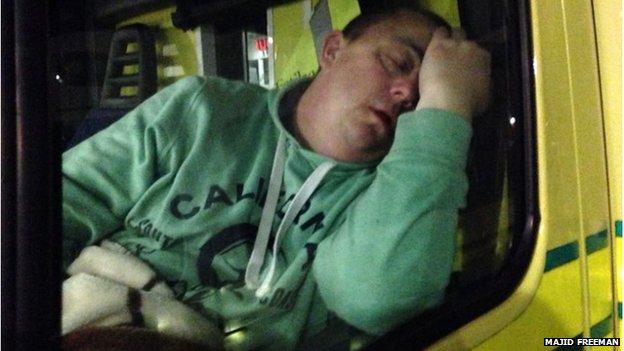
Mr Henning refused to spend money on hotels, sleeping instead in his ambulance
And he said: "More people should show a bit more charity. This way at least you see where it's going, to the right people."
A week after the first IS video of Alan appeared online - the video in which the group threatened to kill him - his wife Barbara released a statement on behalf of the Henning family, pleading for his release.
"When he was taken he was driving an ambulance full of food and water to be handed out to anyone in need," she said.
"His purpose for being there was no more and no less. This was an act of sheer compassion."
'At a loss'
Three days later the family received an audio file of him "pleading for his life" and Barbara Henning issued a second message.
"I have seen Muslims across the globe question Islamic State over Alan's fate," she said.
"We are at a loss why those leading Islamic State cannot open their hearts and minds to the facts surrounding Alan's imprisonment and why they continue to threaten his life.
"Please release Alan."
The leader of the convoy on which Alan was travelling when he was kidnapped was Kasim Jameel who was also a close friend. Mr Jameel said receiving the message was difficult for everyone.
"Receiving a message like that from a loved one - it's difficult for me but that's nothing compared to what the family are going through and that again is nothing compared to what Alan is," he said.
"He is a big softie. What he's going through must be absolute hell - not knowing what's going to happen to him from one hour to the next."
Fellow convoy member Majid Freeman, 26, described how at home Mr Henning had watched a video in which children had died because of a lack of power in a Syrian hospital.
He went on to raise money to buy a generator and took it to the country.
"That's the kind of person Gadget is," Mr Freeman said.
Passport chip
IS captured Mr Henning and dozens of members of the convoy about 20 minutes after they entered Syria.
They were questioned by militants and had their passports taken, but eventually the others - all British Muslims - were released.
Mr Freeman, who was with Mr Henning at the time, said: "That's when we found out that Gadge was actually gone."
IS accused Mr Henning of being a spy, saying the chip in his British passport was an indication of this, and took him away.

Mr Henning was a taxi driver and a keen fisherman
At one point Mr Freeman handed over his own passport to show that everyone, British Muslims included, had this chip. But it was to no avail.
Most of the convoy left Syria in a shaken state - but a small number stayed behind to help in the search for Mr Henning before eventually returning home.
The other members of the convoy still believed he would be released within days.
But on 13 September 2014, Mr Henning appeared at the end of an IS hostage video in which British aid worker Mr Haines was killed.
'Worst nightmare'
Mr Freeman told the BBC seeing him in the video - dressed in orange as other IS hostages had been - was what he and other friends of Mr Henning had been dreading for some time.
"He lost a lot of weight, he looked different and what can you do - it's just your worst nightmare," he said.
"You hear about these things in the news all the time but you don't expect [it to happen to] someone you spent time with, someone you travelled with, someone you ate with, someone you know in real life."
Dr Shameela Islam-Zulfiqar also travelled with Mr Henning on several convoys, including his most recent one, and kept a diary for BBC Radio 5 live, which was not fully broadcast because of his kidnapping.
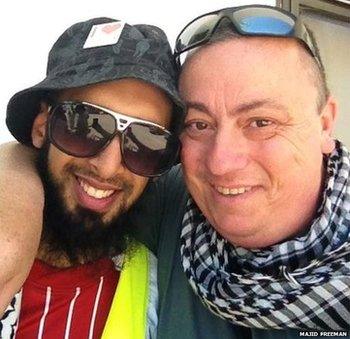
Majid Freeman and Alan Henning became good friends
She said: "Alan is remarkable. He's such a compassionate and selfless human being.
"It just simply wasn't enough for Alan to sit back and just donate or raise awareness. He had to get up and he had to do something about what he'd seen.
"Every time the convoys went, he had this yearning to go. That really motivated him, to see, practically, first hand the difference he was making."
Mr Henning was incredibly popular with other aid convoy members - just about everyone had a funny story about him.
He was a fan of Phil Collins and while the convoy drove through Europe, the traditional Islamic nasheeds (vocal music) played en route would be replaced with Collins.
Other convoy members recounted how - while driving to Syria - when some members wanted to take a rest in a Venice hotel Mr Henning insisted on sleeping in his ambulance, saving the money it would have cost so it could be donated to Syrians instead.
The thing that made Mr Henning stand out for so many was what an ordinary man he was.
A father, a taxi driver and a keen fisherman who just wanted to help the Syrian people.
- Published14 September 2014
